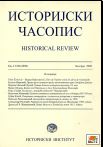Претње казном изопштења у Котору (XIII–XV век)
The Threat of the Penalty of Excommunication in Kotor (13TH–15TH Centuries)
Author(s): Valentina ŽivkovićSubject(s): History
Published by: Istorijski institut, Beograd
Keywords: excommunication; interdict; Kotor; wills; Sacraments; trade; sin
Summary/Abstract: Contempt for canonical laws and theological dogmas resulted firstly in rebuke and subsequently in the pronouncing of sentences, which were hierarchically classified according to the severity of the committed sins. The causes and consequences of punishing by excommunication and interdict in late medieval Kotor have undergone some analysis, based on written sources. Also under review were different causes for the appliance of these penalties – religious, political, economic, as well as those which pertained to the sins of individuals. Prior to the well-known conflict between the city of Kotor and the Pope regarding the appointment of Bishop Sergije II de Bolica, which started in 1328 and gave rise to the imposing of an interdict on Kotor in 1330, the city encountered another instance of interdict imposition, theretofore unknown in the study of this subject matter. This was corroborated by the testament of a denizen of Kotor, Basilius Mathei, registered on October 22, 1327. Basilius had accentuated in this document that he took exception to offering gifts to the priests of Kotor until they were released from excommunication and addressed the Franciscans to lay him to rest and to hold vigilias and pro remedio animae mass. This mendicant religious order, moreover, had the license to perform all church rituals for the duration of the interdict period. The punishing of the citizens of Kotor with an interdict twice during a short period of time speaks of the dynamics of the conflict between the Pope and the city of Kotor and leads to deliberation regarding the existing of the profound underlying reasons for the conflict. Judging by the preserved sources, the citizens of Kotor encountered the threats of excommunication repeatedly: in cases when the last will of the testator was unobserved, when monks indulged in marriage or bigamy, in trading during church holidays, as well as due to physical assaults upon priests and neglect of the monastery by an abbot, and lapses in the holding of church services and neglect of the host. A longer listing of sins which demanded excommunicating from Christian society also brought about a frequent application of this penalty, as well as effecting a strong and efficient clerical, social, political and economic weapon against unfit individuals.
Journal: Историјски часопис
- Issue Year: 2011
- Issue No: 60
- Page Range: 123-138
- Page Count: 16
- Language: Serbian

